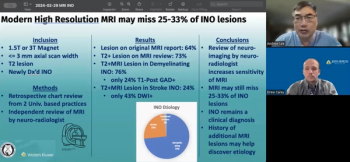
COVID-19: As patients avoid appointments, vision may be in jeopardy
A report out of the United Kingdom revealed more than a 70% reduction in new referrals and a high rate of missed appointments due to the coronavirus, raising red flags for U.S. ophthalmologists.
A report out of the United Kingdom may raise some red flags among ophthalmologists in the United States after it revealed more than a 70% reduction in new referrals and a high rate of missed appointments due to the COVID-19 pandemic.
According to a news release by the U.K.-based
In the report from several U.K. clinics, there also has been a significant drop in new patients presenting with wet AMD, a treatable form of the condition.
That report was compiled by
As a result, investigators have sounded the alarm about the potential impact this could have on patients most at risk for vision loss. In its release, the society said it estimates that this could lead to between 234 and 470 additional cases of severe sight impairment in April alone.
According to Adnan Tufail, MD, one of the authors of the report and a consultant ophthalmic surgeon at Moorfields Eye Hospital, the study’s findings raised concerns that this will increase the burden that the coronavirus is already having on health, well-being and social care costs.
Early treatment may prevent severe vision loss therefore ophthalmologists have urged those at risk to seek treatment, before it is too late, Tufail added in the release. He is also an honorary senior lecturer at UCL Institute of Ophthalmology.
“We have prioritized appointments for patients who are at a higher risk of their sight deteriorating if left untreated for a short time,” he said in the release. “It is very important that patient who have symptoms of wet AMD do not ignore their change in vision, as early treatment may prevent severe vision loss.”
According to Cathy Yelf, chief executive of the Macular Society, it is widely acknowledged that the earlier wet AMD is treated, the more effective the treatment is. As a result it is important if a patient notices any changes to their vision, they get to an ophthalmologists regarding the issue as soon as possible.
“The number of people affected by macular disease is huge and it is a problem which is only getting worse – without the threat of a pandemic,” Yelf said in a statement. “We fear that after the coronavirus crisis, thousands of people will be left blind because they have missed appointments.”
It is an issue that researchers are just beginning to unravel.
“While we understand people’s concerns we know eye clinics across the United Kingdom are doing everything they can to ensure patients receiving injections are kept safe and have heard many positive things from people still attending,” Yelf added.
In March, all routine appointments in eye clinics were postponed, but injections for wet AMD and other conditions which would cause severe visual loss if not treated, were deemed essential. This mirrors what was also happening in the United States. That same month, the
In May, U.S. ophthalmologists began to take steps to begin the process of reopening ophthalmology care. David W. Parke II, MD, CEO of the AAO, stressed in a statement at that time that ophthalmology was not “returning to normal.”
In the U.K. study, the drop in referrals was likely a combination of fear of catching the virus, with those over 70 being instructed to self-isolate, and a lack of routine eye checks taking place after opticians have been closed for routine appointments since the country went into lockdown.
Tufail pointed out in the Macular Society’s release that patients should not be afraid of attending hospital as clinics are following guidance from the Royal College of Ophthalmologists as well as Public Health England to ensure everything possible is being done to make sure patients receiving these injections are in a safe environment.
“This data highlights how important it is that patients attend their appointments, and not ignore new symptoms suggestive of wet AMD,” he said in the statement. “We would like to reassure our patients that we have made every effort to ensure they are safe on site, such as the social distancing measures we have introduced and providing face masks on arrival. The sight and safety of our patients is always our priority.”
According to the release, the UK Ophthalmology Alliance and the Royal College of Ophthalmologists have calculated that at least 10,000 people with a variety of sight-threatening conditions have missed out on care essential to maintaining their sight in England, Wales and Scotland.
According to the New York Times, hospitals and doctors across the country have reported that patients continue to avoid visits out of feat of contagion even as new cases continue to spike.
Many patients who lost their jobs or have experienced a significant drop in income during the pandemic are citing costs as the overriding reason they do not seek the health care they need, according to the newspaper.
The long-term impact on the vision of some patients could be severe.
Newsletter
Don’t miss out—get Ophthalmology Times updates on the latest clinical advancements and expert interviews, straight to your inbox.





























